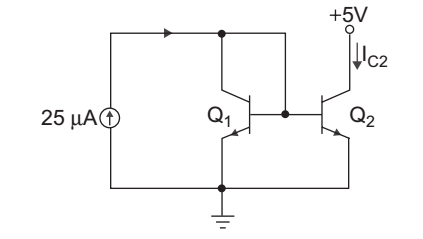Analog electronics circuits miscellaneous
- In the circuit given below the transistor parameters are:
VTN = 1.7 V and Kn = 0.4 mA/V2.
If ID = 0.8 mA and VD = 1 V, then value of resistor RS and RD are respectively: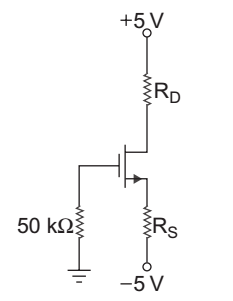
-
View Hint View Answer Discuss in Forum
From figure
ID = 5 – VD RD 0.8 × 10–3 = 5 – 1 RD or RD = 4 = 5 kΩ 0·8 × 10–3
ID = Kn (VGS – VTn)2
or 0.8 × 10–3 = 0.4 × 10–3 (VGS – 1.7)2
or VGS = √2 + 1.7 = 3.11 V VG – VS = 3.11
or VS = VG – 3.11 = 0 – 3.11 = – 3.11 VAgain, ID = VS – (–5) = –3·11 + 5 RS RS or RS = 1·89 = 2.3625 kΩ 0·8 × 10–3 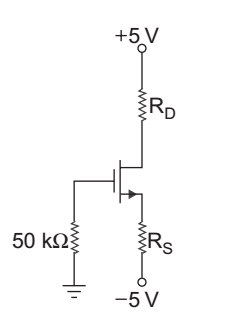
Correct Option: A
From figure
ID = 5 – VD RD 0.8 × 10–3 = 5 – 1 RD or RD = 4 = 5 kΩ 0·8 × 10–3
ID = Kn (VGS – VTn)2
or 0.8 × 10–3 = 0.4 × 10–3 (VGS – 1.7)2
or VGS = √2 + 1.7 = 3.11 V VG – VS = 3.11
or VS = VG – 3.11 = 0 – 3.11 = – 3.11 VAgain, ID = VS – (–5) = –3·11 + 5 RS RS or RS = 1·89 = 2.3625 kΩ 0·8 × 10–3 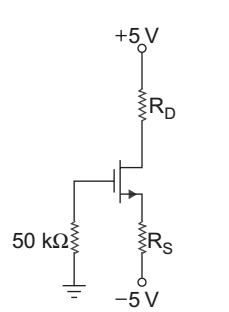
- In the circuit given below, the transistor T3 is used as:
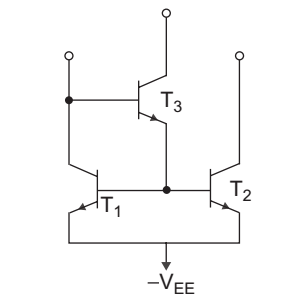
-
View Hint View Answer Discuss in Forum
NA
Correct Option: B
NA
- In which one of the following transistor configuration is the input amplifier least dependent on the load resistance?
-
View Hint View Answer Discuss in Forum
NA
Correct Option: D
NA
- In the circuit of fig. below Zener voltage is Vz = 5 V and β = 100. The value of ICQ and VCEQ are:
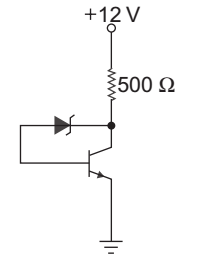
-
View Hint View Answer Discuss in Forum
From figure applying KVL
12 – 500 (Ic + Ib) – Vz – VBE = 0
12 = 500 IE + 5 + 0.7
or IE = I2.6 mAor IC = IE – IB = IE – IC β or IC = β · IE = 100 (12.6) mA 1 + β 1 + 100
= 12.47 mA = ICQ
VCE = 12 – 500. (IE) = 12 – 500 × 12.6 × 10–3 = 5.7
V = VCEQ
Hence alternative (B) is the correct choice.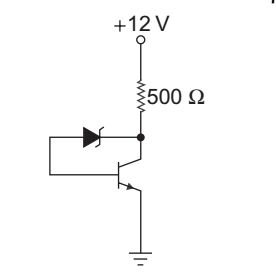
Correct Option: B
From figure applying KVL
12 – 500 (Ic + Ib) – Vz – VBE = 0
12 = 500 IE + 5 + 0.7
or IE = I2.6 mAor IC = IE – IB = IE – IC β or IC = β · IE = 100 (12.6) mA 1 + β 1 + 100
= 12.47 mA = ICQ
VCE = 12 – 500. (IE) = 12 – 500 × 12.6 × 10–3 = 5.7
V = VCEQ
Hence alternative (B) is the correct choice.
- The two transistor in fig. below are identical. If β = 25, the current IC2 is:
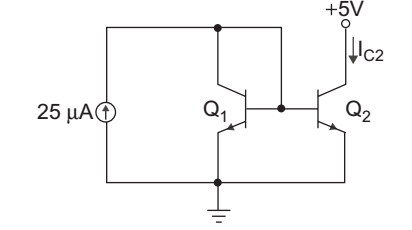
-
View Hint View Answer Discuss in Forum
Since both the transistor are identical, and both the transistor are in the forward active region.
IB1 + IB2 + IC1 = 25 mA ....(i)
VBE is same for both the transistor since both are identical
i.e. IC1 = IC2 and
IB1 = IB2
so, equation reduces
2IB1 + IC1 = 25 µA
or 2IB1 + IB1 . β = 25 µA
or IB1 (β + 2) = 25 µAor IB1 = 25 = IB2 β + 2 or IC2 = β. IB2 = β. 25 β + 2 = 25. 25 = 23.2 µA (25 + 2)
Hence alternative (B) is the correct choice.
Correct Option: B
Since both the transistor are identical, and both the transistor are in the forward active region.
IB1 + IB2 + IC1 = 25 mA ....(i)
VBE is same for both the transistor since both are identical
i.e. IC1 = IC2 and
IB1 = IB2
so, equation reduces
2IB1 + IC1 = 25 µA
or 2IB1 + IB1 . β = 25 µA
or IB1 (β + 2) = 25 µAor IB1 = 25 = IB2 β + 2 or IC2 = β. IB2 = β. 25 β + 2 = 25. 25 = 23.2 µA (25 + 2)
Hence alternative (B) is the correct choice.